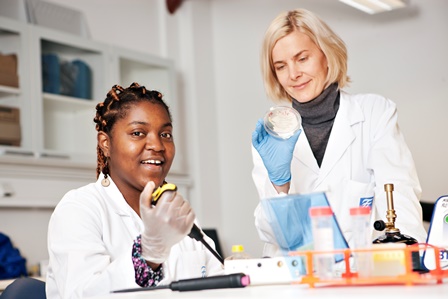 Blogger: Kari Håland
Blogger: Kari Håland
Centre of Molecular Inflammation Research (CEMIR) keeps growing and is entering its second year with plans for increased research activity and more positions.
CEMIR was established on 1. January 2013 as part of the Research Council of Norway’s third round of Centres of Excellence (SFFs). CEMIR’s vision is to find out how sensors in the immune system initiates and regulates inflammatory responses. This new knowledge will be used in disease models to identify new therapeutic targets and diagnostic tools for inflammatory diseases.
This spring, CEMIR is recruiting for several research positions: 3 Post Docs, 2 PhD positions and 1 Staff Engineer. The Post Doc positions have now been announced.
“When CEMIR announced similar positions in 2013, we saw 220 applications,” says Director Terje Espevik. “This gives us a great opportunity to choose the best researchers and to find the most promising research talents.”
CEMIR moved into the new Kunnskapssenteret at Øya Campus in Trondheim in 2013. “We have excellent premises with plenty of room for our employees. The colocation of the centre gives us an excellent basis for establishing a unified milieu, and for cooperation and the exchange of ideas across the research groups,” Espevik says. “At the same time we remain close to the Department (the Department of Cancer Research and Molecular Medicine) in the neighbouring Gastrosenteret, which makes it easy to cooperate both organisationally and translationally.”
As part of becoming a centre, CEMIR has introduced several fixed meeting points bringing together the researchers at the centre. This includes weekly seminars and an article club where the aim is the share knowledge and to get feedback in terms of potential improvements or new research ideas from other colleagues at the centre. The SFF consist of research groups from various related subject fields, and there is no doubt that such close cooperation and exchange of ideas is beneficial.
“We look forward to having even more talented people that will contribute to the knowledge in our field. We constantly discover new research questions that we would like to explore further,” Espevik says.
A central question to CEMIR’s research is how inflammation can be so closely connected to many seemingly different chronic diseases. CEMIR’s research programme has a hypothesis that the key to new therapeutic targets for chronic inflammatory diseases can be found in the early stages of the inflammatory response where sensors in the innate immune system are activated.
The announced Post Docs are in the following areas:
- Inflammation and Bone Disease. Project leader: Therese Standal, therese.standal@ntnu.no
- Inflammation in Pregnancy. Project leader: Ann-Charlotte Iversen, ann-charlotte.iversen@ntnu.no
- Host-pathogen Interactions in Mycobacterial Infection. Project leader: Trude Helen Flo, trude.flo@ntnu.no
Full job descriptions and more information can be found at the recruitment site Jobbnorge:
- Post doctoral position on Host-Pathogen Interaction in Mycobacterial Infection
- Post doctoral position on Inflammation in Pregnancy
- Post doctoral position on Inflammation and bone disease

